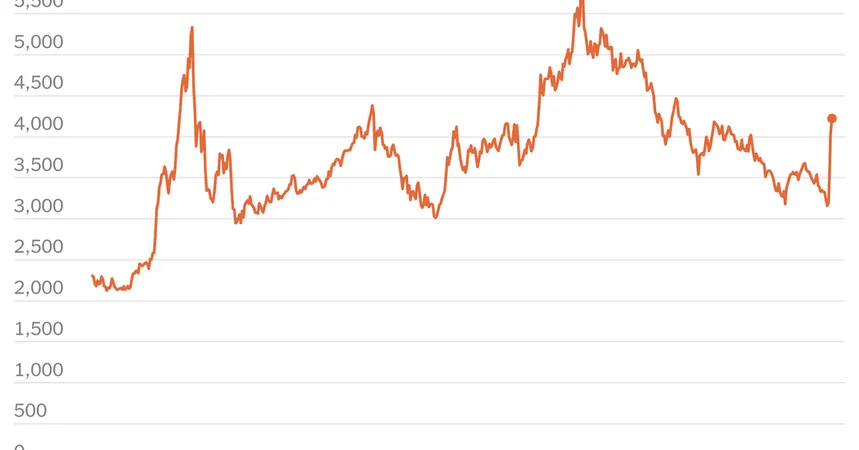
China's Sudden Policy Shift Fuels Stock Market Frenzy – Are You Missing Out?
2024-10-08
Author: Yan
In a stunning reversal, China's stock markets witnessed a remarkable surge on Tuesday as trading resumed after a weeklong national holiday. Investors jumped at the chance to capitalize on new government measures aimed at revitalizing the faltering economy, marking what many are calling one of the most phenomenal stock rallies in recent years.
Before the break, the Chinese government unveiled an aggressive package of stimulus measures designed to halt the alarming decline in real estate prices and bolster consumer confidence. These initiatives included interest rate cuts, lowering the minimum down payments for mortgages, and guiding banks to boost lending. Such encouragement from Beijing sparked a euphoric reaction among investors.
The CSI 300 index, which tracks large firms in Shanghai and Shenzhen, soared nearly 25% in just five trading sessions leading up to the holiday. As trading resumed on Tuesday, it experienced an explosive opening, initially jumping over 10% before stabilizing to a robust 5% increase by midday. This tidal wave of interest wasn’t just confined to local investors; international buyers also flocked to online platforms, eager not to miss out on what could be a historic market resurgence.
Independent investor Tay Chi Keng from Singapore noted a dramatic increase in inquiries about Chinese stocks, with many fearing they would miss a phenomenal opportunity. He shared, "There's a firestorm of interest. Investors are thinking, 'If I don’t stake my claim in the Chinese market, I might just lose out big time.'"
Despite a tough few years for the Chinese stock market, where the CSI 300 and Hong Kong's Hang Seng Index faced steep declines, the recent rally has taken a surprising turn. As of now, the CSI 300 is up by 17% for the year, with the Hang Seng climbing over 35%. This dramatic turnaround raises questions about the sustainability of the rally, as economic recovery remains uncertain.
China's economy has been beset by three years of falling real estate prices, prompting speculation regarding the authority's next steps. While the government aims to provide support, analysts are divided over whether the recent policy changes are merely band-aid solutions or if they signify a shift towards a more consumer-driven economy.
The context for the policymaking shift stands in stark contrast to earlier statements from Chinese leadership. In their last quarterly review, the Politburo emphasized positivity in economic trends, focusing on high-tech industries, including electric vehicles, as key to future growth. Many were caught off guard by the sudden urgency displayed in September as the government aimed to instill confidence during a potentially volatile period.
While some economists argue that this could mark a shift towards consumer spending and sustainable growth, many remaining concerns loom large. The obsession with manufacturing, despite evident overcapacity and price declines in various sectors, underscores persistent challenges.
Underlying these economic trials is the drastic plunge in apartment prices, cornering middle-class families who significantly invested in real estate during the peak years. This demographic heavily relied on these properties for their wealth, often purchasing multiple units as investments.
The question now remains: Is this rally a new dawn for China's economy, or a fleeting mirage? As investors continue to flock to the markets, all eyes will be on Beijing for further policy cues. One thing is certain: as the stock frenzy continues, the urgency to invest is palpable, and the global investment community is watching closely. Are you ready to seize the opportunity before it slips away?




 Brasil (PT)
Brasil (PT)
 Canada (EN)
Canada (EN)
 Chile (ES)
Chile (ES)
 España (ES)
España (ES)
 France (FR)
France (FR)
 Hong Kong (EN)
Hong Kong (EN)
 Italia (IT)
Italia (IT)
 日本 (JA)
日本 (JA)
 Magyarország (HU)
Magyarország (HU)
 Norge (NO)
Norge (NO)
 Polska (PL)
Polska (PL)
 Schweiz (DE)
Schweiz (DE)
 Singapore (EN)
Singapore (EN)
 Sverige (SV)
Sverige (SV)
 Suomi (FI)
Suomi (FI)
 Türkiye (TR)
Türkiye (TR)